
Larisa Semyonovna Latynina is a former Soviet artistic gymnast. Between 1956 and 1964 she won 14 individual Olympic medals and four team medals. She holds the record for the most Olympic gold medals by a gymnast, male or female, with 9. Her total of 18 Olympic medals was a record for 48 years. She held the record for individual event medals, winning 14 over 52 years. She is credited with helping to establish the Soviet Union as a dominant force in gymnastics.
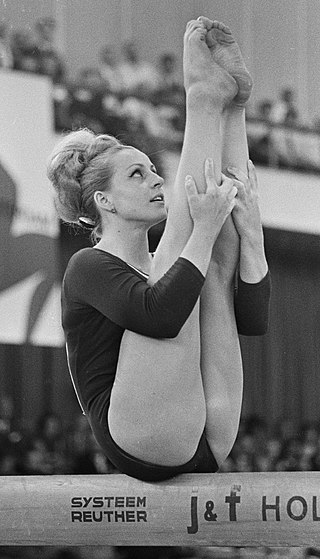
Věra Čáslavská was a Czechoslovak artistic gymnast and Czech sports official. She won a total of 22 international titles between 1959 and 1968 including seven Olympic gold medals, four world titles and eleven European championships. Čáslavská is the most decorated Czech gymnast in history and is one of only two female gymnasts, along with Soviet Larisa Latynina, to win the all-around gold medal at two consecutive Olympics. She remains the only gymnast, male or female, to have won an Olympic gold medal in each individual event.
The 1968 Summer Olympics, officially known as the Games of the XIX Olympiad and commonly known as Mexico 1968, were an international multi-sport event held from 12 to 27 October 1968 in Mexico City, Mexico. These were the first Olympic Games to be staged in Latin America and the first to be staged in a Spanish-speaking country. They were also the first Games to use an all-weather (smooth) track for track and field events instead of the traditional cinder track, as well as the first example of the Olympics exclusively using electronic timekeeping equipment.

Rhythmic gymnastics is a sport in which gymnasts perform on a floor with an apparatus: hoop, ball, clubs, ribbon and rope. The sport combines elements of gymnastics, dance and calisthenics; gymnasts must be strong, flexible, agile, dexterous and coordinated. Rhythmic gymnastics is governed by the International Gymnastics Federation (FIG), which first recognized it as a sport in 1963. It became an Olympic sport in 1984, with an individual all-around event. The group all-around competition was added to the Olympics in 1996. At the international level, rhythmic gymnastics is a women-only sport. The most prestigious competitions, besides the Olympic Games, are the World Championships, World Games, European Championships, European Games, the World Cup Series and the Grand Prix Series. Gymnasts are judged on their artistry, execution of skills, and difficulty of skills, for which they gain points. They perform leaps, balances, and rotations along with handling the apparatus.
Artistic gymnastics is a discipline of gymnastics in which athletes perform short routines on different apparatuses. The sport is governed by the Fédération Internationale de Gymnastique (FIG), which designs the Code of Points and regulates all aspects of elite international competition. Within individual countries, gymnastics is regulated by national federations like British Gymnastics and USA Gymnastics. Artistic gymnastics is a popular spectator sport at many competitions, including the Summer Olympic Games.

At the 1980 Summer Olympics, fourteen different artistic gymnastics events were contested, eight for men and six for women. All events were held at the Sports Palace of the Central Lenin Stadium in Moscow from July 20 through 25th. Several teams who had qualified to compete were absent as a result of the 1980 Summer Olympics boycott, including the United States, Canada, China, Japan, South Korea, and West Germany.

Daniela Viorica Silivaș-Harper, is a Romanian former artistic gymnast best known for medaling in every single event at one Olympics, winning six medals at the 1988 Summer Games in Seoul. In doing so, she was the fourth female gymnast to achieve this, after Maria Gorokhovskaya (1952), Larisa Latynina and Věra Čáslavská (1968). As of 2023, Silivaș is the only one athlete, male or female, having accomplished this feat, in the Modern Era of Artistic Gymnastics, in a non-boycotted Olympics.
At the 1976 Summer Olympics, fourteen different artistic gymnastics events were contested, eight for men and six for women. All events were held at the Montreal Forum in Montreal from July 18 through 23.

At the 1964 Summer Olympics, fourteen different artistic gymnastics events were contested, eight for men and six for women. All events were held at the Tokyo Metropolitan Gymnasium in Tokyo from 18 October through 23 October.
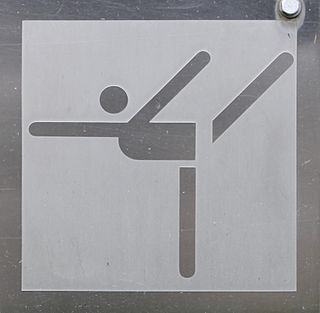
At the 1972 Summer Olympics, fourteen different artistic gymnastics events were contested, eight for men and six for women. All events were held at the Sports Hall in Munich from 27 August through 1 September.
At the 1988 Summer Olympics, two different gymnastics disciplines were contested: artistic gymnastics and rhythmic gymnastics. The artistic gymnastics events were held at the Olympic Gymnastics Hall in Seoul from September 18 through 25th. The rhythmic gymnastics events were held at the same venue from September 28 through 30th.

Larisa Leonidovna Petrik is a former Russian gymnast and Olympic champion. Petrik competed at the 1966 World Championships where she shared the team silver medal and earned an individual bronze medal on the beam. She also competed at the 1968 Summer Olympics in Mexico City, where she received a gold medal in floor exercise, a gold medal in team combined exercises, and a bronze medal in balance beam. Her gold medal on floor was very controversial because originally, Čáslavská won outright. After the competition was concluded, Petrik's prelims scores were changed to let her tie with Čáslavská, an action which caused Čáslavská to publicly defy the Soviets who had recently invaded her home country.

The men's parallel bars competition was one of eight events for male competitors in artistic gymnastics at the 1968 Summer Olympics in Mexico City. There were 117 competitors from 28 nations, with nations in the team competition having up to 6 gymnasts and other nations entering up to 3 gymnasts. The event was won by Akinori Nakayama of Japan, the nation's second consecutive victory in the parallel bars event, tying Germany and the Soviet Union for second-most all-time behind Switzerland at three gold medals. It was the second of four straight Games that the parallel bars would be won by a Japanese gymnast. Mikhail Voronin took silver and Viktor Klimenko took bronze to put the Soviet Union back on the podium after a one-Games absence.
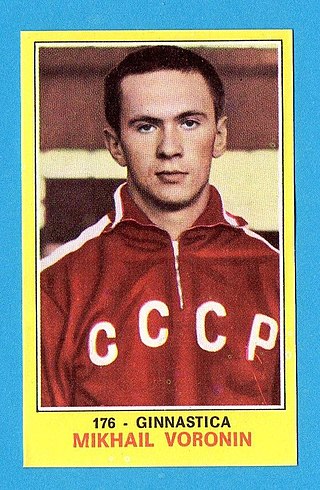
The men's vault competition was one of eight events for male competitors in artistic gymnastics at the 1968 Summer Olympics in Mexico City. The event was held from 22 to 26 October at the Auditorio Nacional. There were 116 competitors from 28 nations, with nations in the team competition having up to 6 gymnasts and other nations entering up to 3 gymnasts. The event was won by Mikhail Voronin of the Soviet Union, the nation's fourth gold medal in the vault. Yukio Endo of Japan took silver, while Soviet Sergei Diomidov earned bronze.
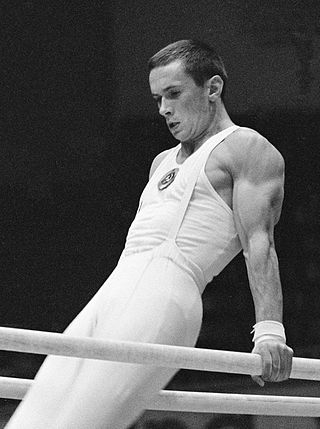
The men's horizontal bar competition was one of eight events for male competitors in artistic gymnastics at the 1968 Summer Olympics in Mexico City. The event was held on 22, 24, and 26 October. There were 115 competitors from 27 nations, with nations in the team competition having up to 6 gymnasts and other nations entering up to 3 gymnasts. The event was won in a tie between Akinori Nakayama of Japan and Mikhail Voronin of the Soviet Union. Eizo Kenmotsu of Japan took bronze.
These are the results of the women's balance beam competition, one of six events for female competitors in artistic gymnastics at the 1968 Summer Olympics in Mexico City.
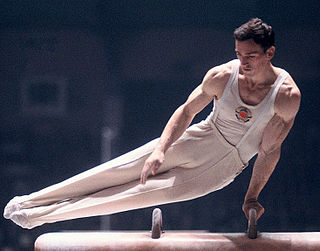
The men's pommel horse competition was one of eight events for male competitors in artistic gymnastics at the 1968 Summer Olympics in Mexico City. The event was held from 22 to 26 October at the Auditorio Nacional. There were 115 competitors from 27 nations, with nations in the team competition having up to 6 gymnasts and other nations entering up to 3 gymnasts. The event was won by Miroslav Cerar of Yugoslavia, the second man to successfully defend an Olympic pommel horse title. Olli Laiho of Finland took silver, while Mikhail Voronin of the Soviet Union finished with bronze. Japan's three-Games podium streak in the event ended, while the Soviet streak stretched to five Games.
These are the results of the women's floor competition, one of six events for female competitors in artistic gymnastics at the 1968 Summer Olympics in Mexico City.
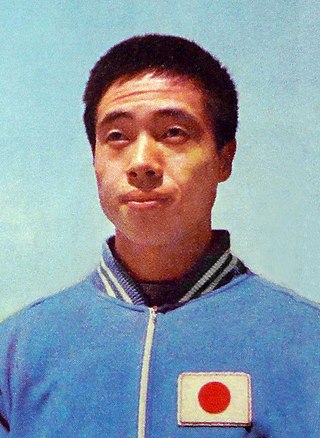
The men's individual all-around competition was one of eight events for male competitors in artistic gymnastics at the 1968 Summer Olympics in Mexico City. It was held on 22 and 24 October at the Auditorio Nacional. There were 117 competitors from 28 nations. Each nation entered a team of six gymnasts or up to three individual gymnasts. The event was won by Sawao Kato of Japan, the nation's second consecutive victory in the event. Kato's teammate Akinori Nakayama took bronze. Mikhail Voronin of the Soviet Union took silver. It was the fifth consecutive Games with a Soviet gymnast on the podium in the men's all-around and the fourth consecutive Games with a Japanese gymnast there; no gymnast from any other nation medaled in the men's all-around from 1956 to 1976. In 1960 and 1964, the two nations had taken 8 of the top 10 places both Games, with Yugoslavia's Miroslav Cerar and Italy's Franco Menichelli the only two breaking up the Japanese–Soviet dominance; this time, Menichelli did not finish all exercises and Cerar was the only person from outside the Soviet Union or Japan in the top 10 as those two nations took 9 of the top 10 places in the event.
These are the results of the men's team all-around competition, one of eight events for male competitors in artistic gymnastics at the 1968 Summer Olympics in Mexico City.












